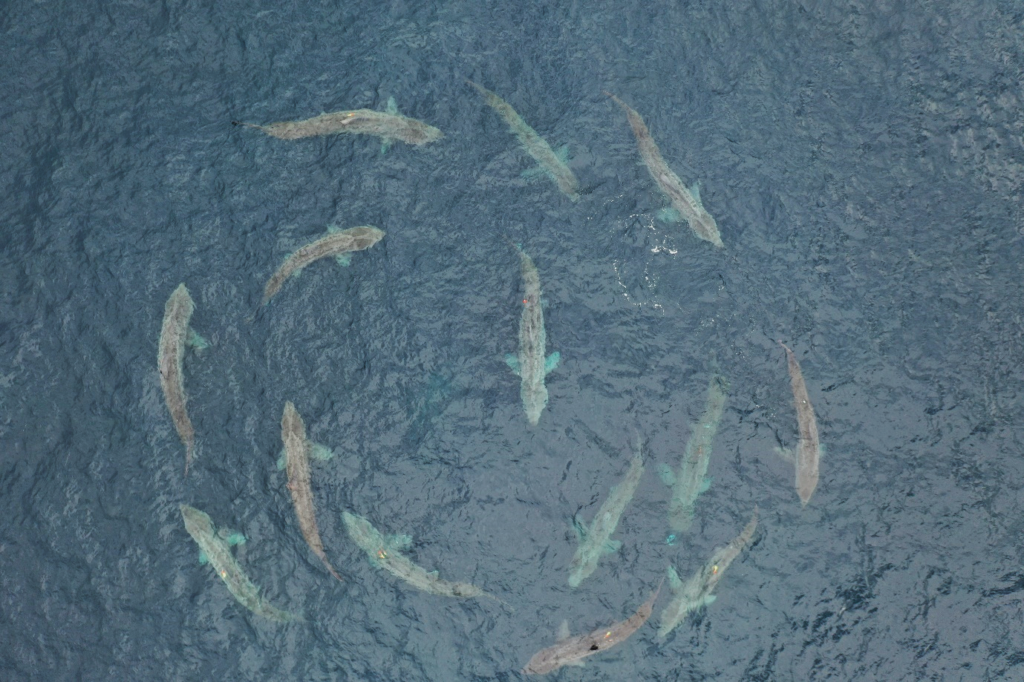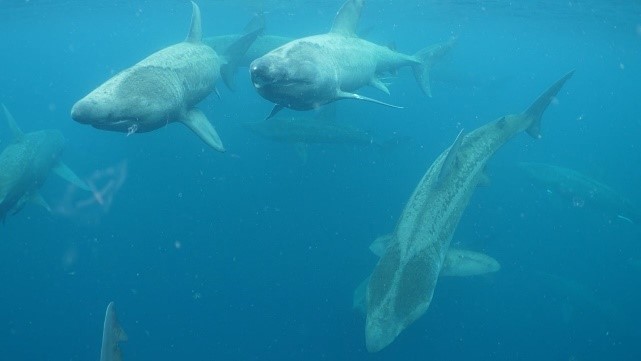Rarely observed circling behaviours of endangered basking sharks have now been explained as ‘shark speed dating’ courtship displays, thanks to a new study.
Marine biologists from the Marine Biological Association (MBA), the Irish Basking Shark Group and colleagues have led ground-breaking research which reveals the circles of basking sharks seen off western Ireland are engaged in annual reproductive behaviour, the first place in the world where this has been verified.
Circling formations have been documented on a few occasions over the past 40 years in the north-west Atlantic off Canada and the USA. Although basking sharks are often seen filter-feeding plankton in UK and Irish coastal waters in the summer, the circling formations were rarely seen, and until now, scientists could not explain the behaviour.
Scientists captured footage of 19 circling groups using underwater cameras and aerial drones off County Clare, Ireland, from 2016 to 2021. They found each group comprised between 6 and 23 sharks swimming slowly at the surface, with others below them deeper down, in a three dimensional ring structure the researchers termed a ‘torus’.

The team found that the sharks in circle formations were equal numbers of sexually mature male and females and were not filter-feeding. Some females had a paler body colour than males, a difference seen during courtship and mating behaviour in other shark species.
The study also showed that despite courtship torus duration lasting several hours, and perhaps even several days, individual females and males associated with most other members within a few minutes. In that time, the sharks interacted through gentle fin-fin and fin-body touching, rolling to expose ventral surfaces to following sharks, and breaching behaviour perhaps as a signal of their readiness to mate.
Professor David Sims, Senior Research Fellow at the MBA and University of Southampton who was lead author of the study said: “How usually solitary basking sharks find a mate in the ocean’s expanse has been an enduring mystery. Incredibly we now find that a courtship torus not only forms but acts like a slow motion ‘speed-dating’ event for assessing lots of potential mates in one go.”
“It is astonishing that this wonder of the natural world has remained hidden for so long, presumably because circles most often form at depth away from surface observation, which could explain why mating itself has never been seen.”
Basking sharks are slow-moving ocean giants which can grow up to 12 metres in length and feed on microscopic animals called zooplankton. Throughout much the 20th Century in the north-east Atlantic they were hunted for liver oil and fins which dramatically reduced population numbers. Basking sharks remain endangered in Europe as populations continue to recover.

Dr Simon Berrow of the Irish Basking Shark Group and Atlantic Technological University, Galway who co-led the field research said: “Our discovery of important basking shark courtship grounds in coastal waters off western Ireland makes it even more urgent that this species gains protection in Irish waters from potential threats, such as from collisions with marine traffic and the impact of offshore renewables.”
Despite protection in many parts of the world, legislation to protect basking sharks in Irish waters was only drafted this year. If signed into law it will be illegal to hunt, injure, interfere with or destroy their breeding or resting places.
The research team hope their findings can inform identification of other basking shark courtship grounds in the UK and further afield in the Mediterranean Sea and Pacific Ocean to ensure appropriate conservation measures are put in place to safeguard this gentle giant’s ‘love dance’.
Read the full paper in Journal of Fish Biology.